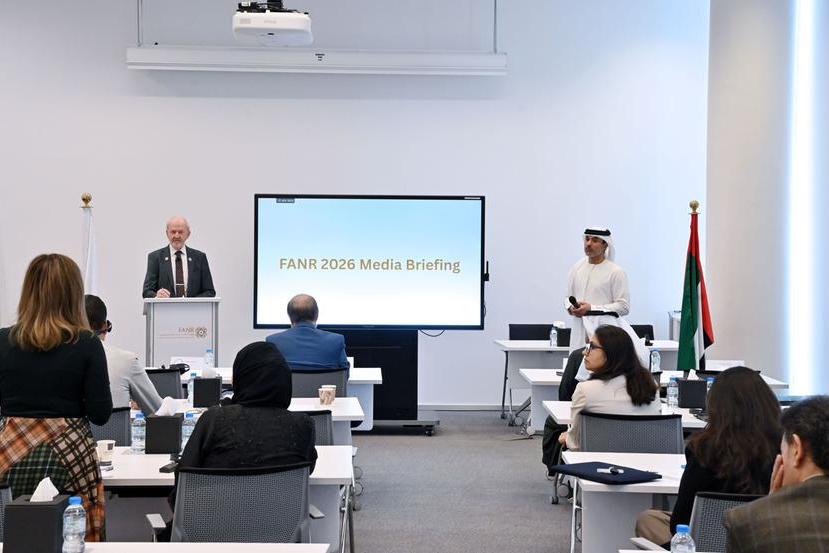Krister Viktorsson, head of the Federal Agency for Nuclear Regulation (FANR), said on Wednesday that the UAE fully complies with the requirements of the nuclear non-proliferation agreement signed with the International Atomic Energy Agency (IAEA), including the Comprehensive Safeguards Agreement and the Additional Protocol.
Viktorson said in a media briefing that 78% of FANR’s nuclear inspectors are Emirati nationals.
He added that FANR maintains strong oversight over the Baraka Nuclear Power Plant, carrying out 36 inspections, amounting to almost 1,300 man-days, across the fields of nuclear safety, security, radiological protection and non-proliferation.
“Barakah is currently the UAE’s largest source of electricity, supplying approximately 25 percent of the country’s electricity needs,” he said. “With all four units in commercial operation, the UAE has set a successful example for new nuclear entrants, many of whom have expressed interest in learning from FANR’s regulatory efforts.”
In 2025, FANR will certify more than 40 reactor operators and senior reactor operators, bringing the total number of Baraka certified personnel to 300, which is essential for the safe operation of nuclear facilities.
As Baraka Unit 1 enters its fifth year of operation, FANR is in the process of approving the periodic safety review submitted by Nawa Energy Company, which covers plant design, aging management, safety culture, and other critical safety factors to ensure safe and reliable operation of the plant.
Victorson said FANR also oversaw refueling and maintenance activities for all four units that year.
Regarding non-proliferation, FANR conducted 48 safeguard-related inspections and 98 import/export control inspections in 2025, ensuring licensees’ compliance with regulatory requirements.
“We have fully fulfilled the requirements of the Nuclear Non-Proliferation Agreement signed with the International Atomic Energy Agency, including the Comprehensive Safeguards Agreement and the Additional Protocol. The IAEA has confirmed that the UAE has achieved ‘broad conclusions’ status for the third consecutive year in 2025,” Viktorsson said, noting that this is the highest level of assurance provided by the agency.
Additionally, FANR strengthened its cooperation with the IAEA through the UAE Safeguards Support Program and supported the agency’s comprehensive capacity building initiatives for new entrant countries.
The agency also contributed to the IAEA’s COMPASS initiative by providing technical assistance to Bangladesh, including a review of the export and import control framework. This contribution was recognized by the IAEA as strengthening the international nuclear non-proliferation regime.
In nuclear security, FANR conducted 59 nuclear security regulatory inspections on facilities using radioactive materials and 322 inspections on vehicles transporting radioactive materials.
Additionally, FANR integrated its vehicle inspection system with the UAE Federal Traffic and Licensing System, reducing the time it takes to obtain a license from five days to 15 minutes, supporting the government’s Zero Bureaucracy Program.
The agency won the ‘Best Incident Response Award’ at the 2025 Cybersecurity Awards for its enhanced cyber resilience.
During 2025, FANR issued approximately 1,770 licenses to medical and non-medical facilities, more than 1,600 import and export permits for radioactive sources, and conducted 227 inspections of facilities using radioactive sources. The company’s secondary standard dosimetry laboratory has carried out the calibration of approximately 1,600 instruments for customers across the UAE.
Mr. Viktorson also announced the graduation of the first batch of the National Nuclear and Radiological Emergency Personnel Certification Program, which will be launched in 2024 in cooperation with the Ministry of the Interior and aims to train 3,000 emergency personnel.
FANR conducted and participated in 15 national and international emergency training exercises, including scenarios involving cross-border nuclear emergencies, and conducted 10 professional nuclear emergency training courses for over 60 personnel.
The authority currently participates in and leads 12 active national and international research projects and has launched a regulatory research program in 2025 to fund and support national research in radionuclides, nuclear safety, and related fields. In 2026, the program will support five research projects in collaboration with the Emirates Nuclear Technology Center, Khalifa University and other partners.
The authority employs 245 staff, of whom 79% are Emirati nationals and 73% are Emiratis in technical positions. FANR has so far qualified over 90 inspectors and launched the Emirates Atomic Energy and Radiology Academy Ambassador Program at the University of Sharjah, with over 740 students enrolled.
Viktorsson said FANR continues to play a leading role in the global nuclear community, having signed 10 understanding and cooperation agreements with domestic and international partners.
He added that the authorities have adopted a 2027-2029 strategy aimed at further strengthening the UAE’s nuclear and radiological regulatory framework in line with national priorities.
The strategy is built around three core pillars: nuclear governance and regulatory leadership. nuclear and radiological safety, security, and safeguards; Nuclear and radiological emergency preparedness and response are supported by cross-cutting enablers in capacity building and innovation.


